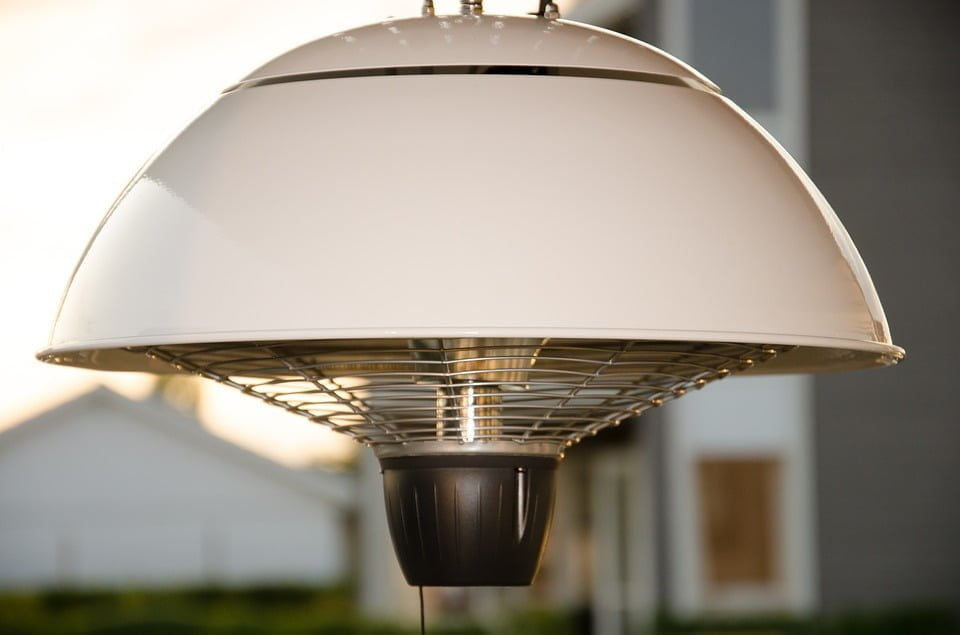There are lots of different things that are said about patio heaters. Do they really work? Here’s the scoop: yes they do! Patio heaters are specially made to create a warmer outside environment. Of course, there are different types and sizes of patio heaters that each work differently. It all depends on what you’re looking for. Here’s everything you need to know in order to get a patio heater that really works for you so you can enjoy your patio all year long.
What Is a Patio Heater?
A patio heater is a heater that emits radiant heat instead of hot air. I know this doesn’t sound like it makes a very big difference but it does! Space heaters heat up air molecules which can dissipate by the time they reach you on the other side of the patio. Since a patio is outside, chances are that any wind would immediately push that hot air away. This is why its necessary that a patio heater uses radiant heat. Radiant heat travels through the air so that your patio stays warm. Patio heaters are usually tall and resemble a standing lamp. Instead of a light bulb at the top, they have a flame, or coils, that emit heat. There are also patio heaters than can be hung instead of standing.
Types of Patio Heaters
The efficiency of your patio heater largely depends on the kind you get. There are several different types of patio heaters that you’ll be able to choose from. The type of patio heater that will fit your needs depends on how much heat you’re going to need. A smaller patio doesn’t need as much heat, while a large open patio is going to need a really powerful heater. Each type of patio heater will do a good job of heating but to different degrees.
Natural Gas Patio Heaters
A natural gas patio heater is a permanent fixture. Houses that use natural gas for their appliances will be able to connect their patio heater to their natural gas line. You won’t have to refill your heater with gas because it will be connected to your gas supply. However, the setup is a lot more expensive because you’ll need a professional to come and install the heater. These natural gas heaters cannot be moved since they’ll be connected to a gas line. Once they’re set up somewhere, they have to stay there. Natural gas does a good job at heating any patio and you’ll be really warm even in Winter.
Electric Patio Heaters
The only thing that electric patio heaters need is an outlet. So you won’t need to worry about hooking it up to any gas lines or refilling a gas tank. You might see an increase in your electric bill if you plan on using your electric heater frequently. Electric heaters don’t produce any emissions and they’re pretty efficient at producing heat. You’ll need to make sure that the power cord isn’t anywhere that it could be tripped on so that the heater doesn’t get knocked over. Patio heater safety is very important. Electric patio heaters also work fairly well at heating up patios. They have a really quick and easy setup since all you have to do is plug it in. That means you’ll be able to start enjoying some heat sooner.
Propane Patio Heaters
Propane patio heaters are the big daddy of outdoor heaters. They put out the most heat so that everyone can feel it, even people that are across the patio. The radiant heat that propane heaters put out, will usually spread out more than the other types of heaters. They’re portable so you don’t have to decide on one location like with a natural gas heater. You can get your propane heater working all on your own, unlike a natural gas heater. The only downside to a propane patio heater is that the propane tank needs to be refilled every so often. Of course, it depends on how much you use the heater. It’ll cost money every time the tank needs to be refilled. Natural gas and electric heaters don’t have this problem.
Understanding BTU’s
What Is a BTU?
BTU stands for British Thermal Unit. It’s equivalent to the amount of heat it takes to increase one pound of water by 1 degree (Fahrenheit). That sounds complicated but BTU’s are basically the amount of heat that something is putting out. In order to find a good heater for your patio, you’ll need to know the BTU’s so that the heater can effectively heat the required space.
How Many BTU’s Do I Need?
This part gets a little more complicated. You’ll need to figure out how many BTU’s your patio heater needs to put out in order to heat your entire patio. There are some variables for figuring out the BTU’s.
Size of Space
Find the square feet of the area you are trying to heat. This is just length times width.
Outdoor Temperatures
If you want to go outside in freezing temperatures, you’re going to need more BTU’s than if you want to go outside in 50℉.
Calculating BTU’s
There’s a simple formula to figure out how many BTU’s you’re going to need to heat a specific space. The formula is 20 BTU x Area (ft2). So if you’re patio measures 400 square feet, you’ll need to put that into the formula. 20 BTU x 400 (ft2) = 8,000 BTU’s. You’ll need a patio heater that puts out 8,000 BTU’s to heat your patio. It’s not so hard! A little math can help you with a lot of things! If you plan on using patio heaters in the dead of Winter, you’ll need more BTU’s since the outdoor temperatures will be colder. Or you use an online BTU calculator.
Wind Protection
It’s also best to find some sort of wind protection for your patio if you’re going to be out on a windy night. Nothing takes away heat faster than a chilly wind. Patio heaters can only do so much on their own, and powerful winds will make them less effective. You could have the most effective and expensive patio heater on the market, but if there’s a freezing wind you’ll know it. Winds under 15 mph usually won’t cause too many problems with reducing the heat.
Summing Up
Yes, patio heaters work. They work really well! You’ll be able to sit outside and stargaze all year round without freezing to death. Enjoy a nice book outside or have some family over and cook s’mores. Don’t let chilly temperatures keep you from enjoying the nice patio that you worked hard to decorate. Each type of patio heater has its own set of pros and cons that you can keep in mind when you’re looking for a heater to buy. Don’t forget to calculate the BTU’s the outdoor heater will need to put out in order to keep your patio nice and toasty.
Related Article: Best Space Heater for You: Our Top 10 Reviewed











